Andrew Furst's Blog, page 62
May 6, 2016
Why Does Religion Always Go Bad? – Modern Koans
Ouch. To those of us who are religiously inclined, this is a pretty biting question. But I don’t think that anyone should be surprised by it. Religion looks ridiculous from a lot of angles. Scientology looks crazy to Christians, Mormons sound nuts to Jews, and Islam sounds evil to Hindus.
The question is open to a particularly Buddhist line of questioning. Given that expectations are the root of suffering, what reasons do we have to believe in the purity and longevity of religions? Is it timeless or time bound? Is it reasonable to expect a religion to remain unchanged or even last for more than a few centuries (or weeks)?
Religion is more of a process than anything else. It is a reconnecting with the divine and process is change. If we take on spiritual practice, it starts from our particular point of view and inspires us to broaden it.
Our response to the process varies by person. Different people close the gap to the sacred in different ways. Like people, religions each take their own approach. For example Islam, Buddhism, and Shintoism all have different objects of worship, rules, rituals, and sacred texts.
For the person seeking a connection to the divine, religious practice is a very fluid and personal process. Both in terms of our choice of religion and the practice we undertake.
Institutions on the other hand are the antithesis of fluidity. To persist, they must define and adhere to an identity. As a result, there is a calcification of doctrine in time. This produces something like spiritual rigor mortis. Traditional religions become museums containing both wonderful spiritual insight and archaic misogyny.
For me personally, I have a love/hate relationship with religion. At best I am loosely affiliated with a Pure Land Buddhist lineage. At worst, I can be found railing against some form of absurd dogma.
I look at it this way. We are all seeking. Religion is a platform from which we might fulfill that search. Religion is a means to an end. Seeking is the unchanging and lasting quality of life. While religion is like an apple, for a brief time it can be nourishing and flavorful, but it soon spoils and becomes fertilizer for the tree.
Yes, religions go bad. Like anything else, they are subject to impermanence. To believe the contrary is equivalent to what Buddhists describe as the delusion of self. Clinging to the purity and immutability of religion is just another recipe for suffering.
In your opinion, what is important about religion? Do the pros outweigh the cons?
I'd love to hear your thoughts in the comments below.
Modern Koans is an ongoing series that recognizes that good questions are often more important then their answers.
The riddles of God are more satisfying than the solutions of man. ― G.K. Chesterton
Get Each Week's Modern Koans In Your Email Box
If you enjoyed this post, please like and share.
The post Why Does Religion Always Go Bad? – Modern Koans written by Andrew Furst appeared on Andrew Furst.
May 5, 2016
John Muir on Beauty – Quotes
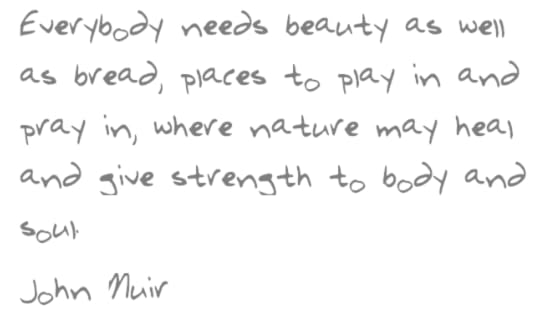
Quotes -The path to right view is an arduous walk through fields of manure.
Get Each Week's Quotes In Your Email Box
If you enjoyed this post, please like and share.
The post John Muir on Beauty – Quotes written by Andrew Furst appeared on Andrew Furst.
Bash Bish Falls – A Two Minute Meditation
The first weekend in March I was able to take a little excursion out to Western Massachusetts to go shoot some waterfalls. It was a fun and invigorating weekend. I saw four beautiful waterfalls in late winter glory and had to get my mini winched out of a small gully (what wilderness weekend isn’t complete without a winching!). My first stop was Bash Bish Falls.
Bash Bish is billed as “the state’s most dramatic waterfall” in my waterfall Bible New England Waterfalls: A Guide to More Than 400 Cascades and Waterfalls. It didn’t disappoint.
Perhaps it is my exhaustion after bouncing around outdoors all weekend, but my feeling when pulling together this minute meditation was that no embellishment was necessary. No poems, guiding words, or the like. Let the sound and image of the waterfall guide you to where you need to go.
If you enjoyed this post, please like and share.
Minute Meditations is an ongoing series of short videos, poems, and commentary intended as a meditation. Offered as an opportunity to step back from your cyber routine and settle into a more natural rhythm, if only for a minute.
Get Each Week's Minute Meditations In Your Email Box
These videos are produced for those of us who spend an inordinately large amount of time in the cyber-world. They are not a substitute for unplugging from your devices and taking a stroll near trees, water, or a patch of unkempt grass. Getting out into the world - touching, smelling, hearing, and seeing nature is the best way to reconnect with our prime purpose.
What is our prime purpose? We are feeling and sensing machines. We are the universe looking back on itself. We are witness to the wonders and dangers of living in this corner of the cosmos. We are the seekers looking for connection a little further beyond yesterday's borders and boundaries.
But sitting and staring at the screen robs us of the sustenance that we rely upon for wonder and sanity. These videos are an opportunity to bring the sensations of nature to you, while you're in the cyber-world. Its an opportunity to relax your gaze, resettle your posture, and regain some depth in your breath. Listen and watch the video and allow your self to open up and recharge.
The post Bash Bish Falls – A Two Minute Meditation written by Andrew Furst appeared on Andrew Furst.
May 4, 2016
May The Fourth – Verse Us (Poems by Me)
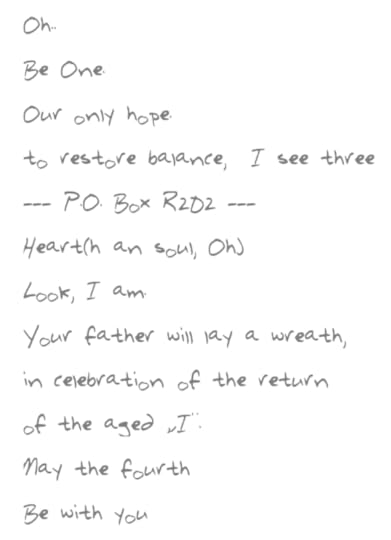
Verse Us - Poems I write: haiku, senryu, mesostics, free verse, random word constructions, I might even use rhyme or meter once and a while.
Get Each Week's Poems In Your Email Box
If you enjoyed this post, please like and share.
The post May The Fourth – Verse Us (Poems by Me) written by Andrew Furst appeared on Andrew Furst.
May 3, 2016
The Flower by Alexander Sergeyevich Pushkin – Compass Songs
A flower – shrivelled, bare of fragrance,
Forgotten on a page – I see,
And instantly my soul awakens,
Filled with an aimless reverie:
When did it bloom? the last spring? earlier?
How long? Where was it plucked? By whom?
By foreign hands? or by familiar?
And why put here, as in a tomb?
To mark a tender meeting by it?
A parting with a precious one?
Or just a walk, alone and quiet,
In forests’ shade? in meadows’ sun?
Is she alive? Is he still with her?
Where is their haven at this hour?
Or did they both already wither,
Like this unfathomable flower?
Compass Songs is an ongoing series of works by poets that I enjoy. Poetry, as the Zen Masters have said, is like a finger pointing to the moon. It speaks the unspeakable.
Get Each Week's Compass Song In Your Email Box
If you enjoyed this post, please like and share.
The post The Flower by Alexander Sergeyevich Pushkin – Compass Songs written by Andrew Furst appeared on Andrew Furst.
May 2, 2016
One With The Universe? – Dialectic Two Step
Estimated reading time: 16 minute(s)
Woah, Woah, Woah, there. Hold on a second. Let’s back away from the hyperbole and take a nice deep breath now. What do you mean “we’re all one with the universe”? No really, do you know what you mean? In a lot of ways it’s a pretty counter intuitive idea. How sturdy is this Buddhist aphorism? I think it deserves a little poking?
Probably, most of us have an abstract sense of oneness. We’re all part of a whole. We’re all in this boat together and so on. But if we drill down, how far does this interconnectedness hold up?
If we drill down, how far does interconnectedness hold up?
Click To Tweet
Let’s start with the arguments against oneness. It’s pretty easy to come up with examples of how we’re not connected.
First of all, within our own species we live lives quite apart from each other. Our minds and bodies are substantially disconnected. We don’t directly feel the pain or hear the thoughts of others. If I eat a piece of food, your stomach isn’t filled. If you drink a glass of water, my thirst is not quenched. When one of us dies, the other lives on.
Even on an abstract level, we’re rarely in synch. Our perspectives, developed from our unique experience, always differ. We hold ideas on a spectrum rather than uniformly. We have nuanced beliefs that differ from person to person. Each of us views the world from a singular vantage point and we have strong preferences centered on our own survival, reproductive imperatives, and prosperity.
Take another step beyond the circle of humanity, we share even less of a connection with the animals and plants that cohabitate our ecosystem. Generally we have little regard for them and certainly have much less in common.
Stepping further, we have a presumptive relationship with our planet. We absorb its resources with impunity and any concern we have is related to our dependence on it. Expanding beyond the boundaries of our planet is really beyond our day to day capacity. Our circle of interest is typically confined to our personal space.
So honestly, does it make any sense to say that we’re all one with the universe? Is there a context in which it makes sense? Or is it just another nonsensical religious idea ready for the garbage heap?
Is oneness just another nonsensical religious idea ready for the garbage heap?
Click To Tweet
An Experiment
Here’s a thought experiment that might help. Let’s imagine a universe without humans. In fact given the duration and impact of our residency here, imagination doesn’t have to carry us very far. We are less consequential than the speck on the mole on the frog on the bump on the log in the hole at the bottom of the sea.
So, would the universe miss us? For millions of years life on earth has ebbed and flowed, flourished and declined. It has been gently oscillating near equilibrium for millions of years. All the while evolution shaping life as part of this balance.
While we often naively perceive this balance as harmony, it is a rather cold and harsh phenomenon. Mass extinctions and the wonder of intelligent life go unnoticed to the vacant stare of the universe. And individual lives have little value in nature’s equations.
This is a sobering, and perhaps depressing view of nature, but it is a perspective to consider as an intelligent life form capable of great good and great evil in this world. This is where the thought experiment bears fruit. Our intelligence creates unique opportunities and burdens.
Our large brains with their highly developed frontal cortexes, provide us with significant storage and computing power. Combine that with a consciousness into which ideas can be formulated and actions executed, we are formidable creatures.
The opportunities are boundless. We are harnessing the very fabric of the universe to do our bidding. We are contemplating the vastness of the universe, its growth from seemingly nothing to infinite space. But as I mentioned, there are burdens that come with our abilities.
With consciousness comes imagination. Imagination allows us to create entire worlds in memory. From it, humans have created astonishing art, literature, music, and scientific theories. But we have also used it to imagine greed, hatred, and delusions. We’ve formulated deeply repressive ideologies that have led to genocide and the destruction of our environment.
In short, consciousness and imagination can serve as a barrier between us and the rest of the world. As we replace each object in the world with a name, an idea, we become further removed from direct experience. We are susceptible to the machinations of these inventories and narratives in our minds. We mistake someone’s tired facial expression with a malicious look or conflate a mole hill with a mountain.
Union
Many Buddhists around the world practice the recitation of mantra. Let’s take the mantra of compassion ‘Om, mani padme hum.” The final syllable – hum – can be translated as union. In Pure Land Buddhism, the chanting of the name Amitabha symbolizes our utter and complete reliance on “other power”. Only through union with Amitabha can we be saved.
To put this in context, union (or oneness) means a rediscovery of direct experience. It is a balance between the benefits and burdens of our consciousness. There are clear benefits to thinking through how we respond to life, but we must be grounded in and available to discern what our senses are telling us.
The Buddhist appeal to oneness is an antidote to the uniquely human problem of living in our heads
Click To Tweet
The Buddhist appeal to oneness is an antidote to the uniquely human problem of living in our heads. While many of us swoon at the implications of quantum entanglement and other theories that seem to imply deeper connections, we should be careful about misapplying the concept of oneness.
It is a very practical reminder that we must be mindful of our relationship with our surroundings, including our partners, families, friends, acquaintances, and the environment.
Dialectic Two-Step is an ongoing series of my thoughts on questions that come my way.
Wisdom lies neither in fixity nor in change, but in the dialectic between the two. - Octavio
Get Each Week's Dialectic Two Step In Your Email Box
If you enjoyed this post, please like and share.
The post One With The Universe? – Dialectic Two Step written by Andrew Furst appeared on Andrew Furst.
May 1, 2016
Robert Motherwell On Art – Quotes
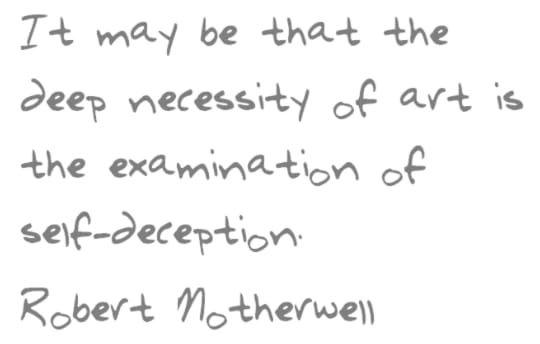
Quotes -The path to right view is an arduous walk through fields of manure.
Get Each Week's Quotes In Your Email Box
If you enjoyed this post, please like and share.
The post Robert Motherwell On Art – Quotes written by Andrew Furst appeared on Andrew Furst.
Strawberry – Verse Us (Poems by Me)
Her irises darting, probing.
Her tastes floated and churned behind mine
Brushed, warm, wet
lips and tongues.
We kissed until it burned;
numbed but unsated.
Fear, passion, pheromones blended
flammably
and ignited on a fire of psychotic teen heartbreak.
Stalking, trembling, steering my soul
past it
(but always dragging it behind)
Verse Us - Poems I write: haiku, senryu, mesostics, free verse, random word constructions, I might even use rhyme or meter once and a while.
Get Each Week's Poems In Your Email Box
If you enjoyed this post, please like and share.
The post Strawberry – Verse Us (Poems by Me) written by Andrew Furst appeared on Andrew Furst.
April 30, 2016
It’s a Game? – Say What?
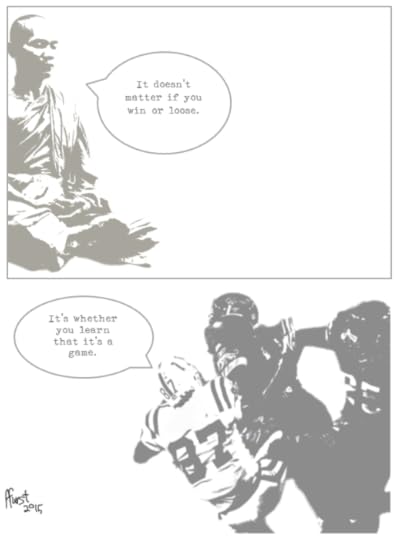
Say What? is an ongoing series of laconic exchanges on Buddhism in the format of a comic strip.
Get Each Week's "Say What?" Comic In Your Email Box
If you enjoyed this post, please like and share.
The post It’s a Game? – Say What? written by Andrew Furst appeared on Andrew Furst.
April 29, 2016
The Oxherd Series – In the World – Modern Koans
The Oxherd Series is a collection of 10 images and commentary on the quest for enlightenment. Its source is the Zen tradition. What you're reading here is a satirical, but not all together purposeless, treatment of these so called stages. Using excerpts from one of my favorite cartoons, Bob's Burgers, I hope to bring this old story into the present.
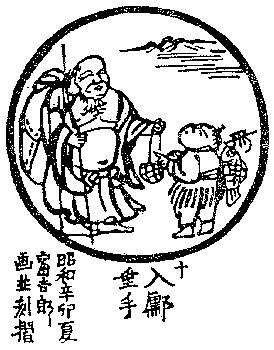
There are no more barriers to the inner light of life. Clarity from a place of openness exudes from our acts, speech, and thoughts. Our emotions – no longer something to regret or repress – become our friends and messengers. Each sensation a connection to wholeness. Our true love greets us in the sun, the moon, the wind, and the rain.
Same as it ever was…
Same as it ever was…
Look where my hand was
Time isn’t holding up
Time is an asterisk
Same as it ever was…
Same as it ever was…
– David Byrne
Barefooted and naked of breast,
I mingle with the people
of the world.
My clothes are ragged and dust-laden,
and I am ever blissful.
I use no magic to extend my life;
Now, before me, the dead trees
become alive.
I'd love to hear your thoughts in the comments below.
Modern Koans is an ongoing series that recognizes that good questions are often more important then their answers.
The riddles of God are more satisfying than the solutions of man. ― G.K. Chesterton
Get Each Week's Modern Koans In Your Email Box
If you enjoyed this post, please like and share.
The post The Oxherd Series – In the World – Modern Koans written by Andrew Furst appeared on Andrew Furst.




